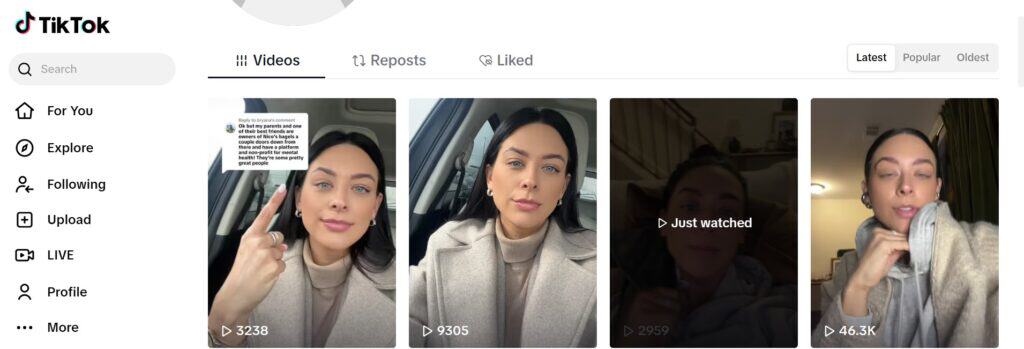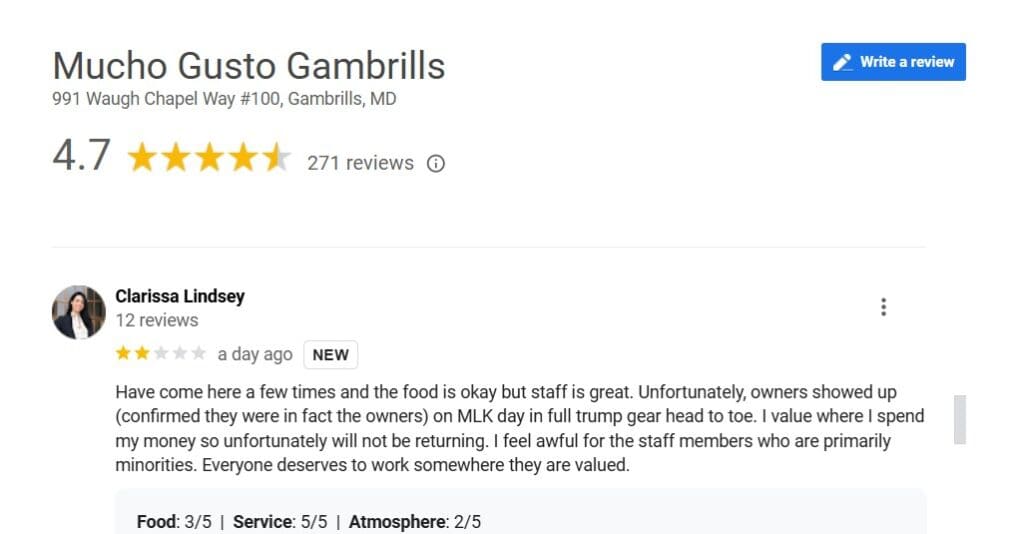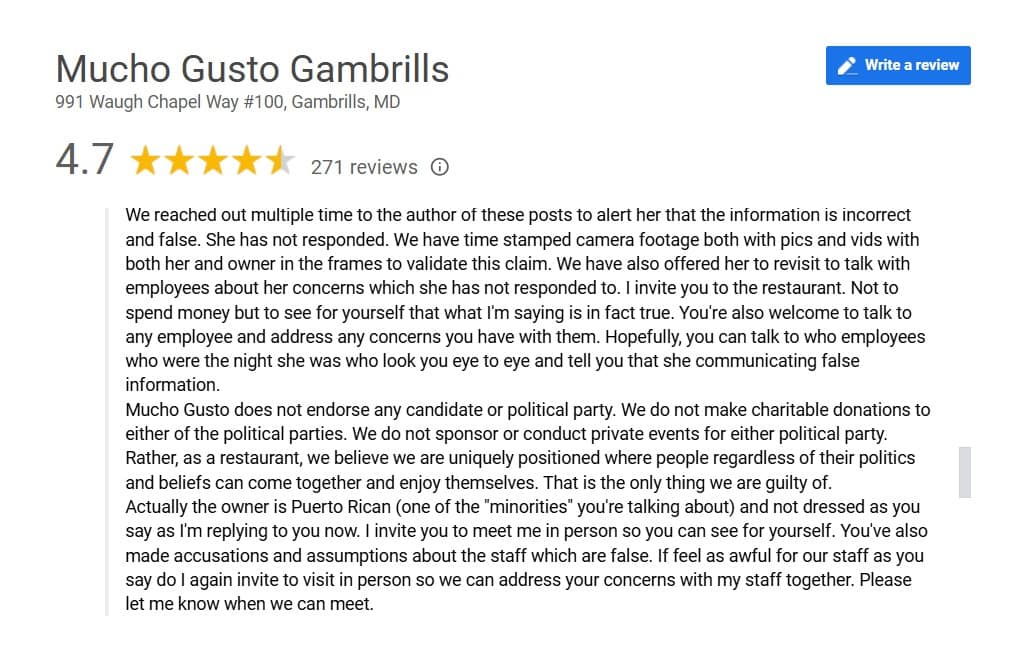An Annapolis attorney’s social media campaign against an Anne Arundel County restaurant took an unexpected turn on a day when America split its attention between Martin Luther King Jr.’s legacy and President Donald J. Trump’s second inauguration.
The story began at Mucho Gusto, a well-loved Mexican restaurant in Gambrills, Md.
Maryland criminal defense attorney Clarissa Lindsey claimed she witnessed the restaurant’s owners entering their establishment “in full MAGA and Trump gear head to toe” on January 20, 2025, Inauguration Day.

Lindsey, whose legal practice promises “aggressive but compassionate” representation, took to TikTok to announce her plans to “expose” local businesses owned by Trump supporters.
The text from her video is listed below:
“I think now that TikTok is back, I’m going to make a series that’s very niche to Maryland and D.C. locals that exposes or talks about establishments who are owned or primarily managed by Trumpers. It is MLK day, and I just went to Mucho Gusto in Crofton and the owners – which were confirmed owners – walked in in full MAGA and Trump gear, head to toe.
Do with that information as you will. I don’t want to argue because I don’t do charity work with people who aren’t capable of having educated conversations. But I think it’s important for people to know where they spend their money.”
The Maryland lawyer followed up with a Google review expressing her concerns about the restaurant’s minority staff members.

In a detailed response to Ms. Lindsey’s Google review, Mucho Gusto’s ownership revealed a starkly different version of events.
Not only did the restaurant claim to have time-stamped camera footage showing Lindsey and the owner in the same frame, contradicting her claims about the owner’s attire, but the owner himself is Puerto Rican—one of the “minorities” Lindsey claimed to be concerned about.
“Mucho Gusto does not endorse any candidate or political party,” the owner stated, extending multiple invitations for Lindsey to return and verify the facts for herself. “We believe we are uniquely positioned where people regardless of their politics and beliefs can come together and enjoy themselves. That is the only thing we are guilty of.”

The restaurant’s response highlighted repeated attempts to contact Lindsey to correct the record, including offers to meet with the staff members who were present that night.
*UPDATE*
As of Thursday, Jan. 23, Clarissa Lindsey removed her initial Google review and TikTok video criticizing the restaurant. In a new two-star review posted on Google, she acknowledges seeing the owner’s attempts to reach out, though she claims uncertainty about how they tried to contact her.

Maryland Lawyer Clarissa Lindsey’s Legal Work
The irony deepens when considering Lindsey’s legal background, which includes work with the Innocence Project – an organization dedicated to overturning wrongful convictions based on false accusations.
Yet here was a Maryland bar-certified legal professional making unsubstantiated claims that could harm a minority-owned business and its employees.
This incident is a cautionary tale about the intersection of social media, professional responsibility, and the rush to political judgment.
While Clarissa Lindsey’s business website promotes understanding and empowerment, her actions that Monday afternoon seemed to ignore the basic principles of due diligence and fair hearing, cornerstones of the legal profession she represents.
The restaurant’s measured response offers a crisis management and community relations masterclass.
Rather than escalating the conflict, they opened their doors wider, inviting verification of their claims and dialogue with their staff.
“Please let me know when we can meet,” the owner concluded, extending an olive branch where others might have wielded a sword.
A Potential Professional Price of a Social Media Post
Having covered Maryland news and politics for nearly ten years, I can’t help but note the profound professional implications this incident could have for Ms. Lindsey.
The irony is striking: A former Innocence Project attorney, who built her career on fighting false accusations, now makes unsubstantiated claims that video evidence directly challenges.
This situation is particularly concerning because it conflicts with Lindsey’s professional obligations.
Lindsey’s credibility is her currency as a criminal defense attorney and federal practitioner.
Her website promises “aggressive but compassionate” representation and emphasizes understanding clients’ needs. Yet her social media declaration about not doing “charity work with people who aren’t capable of having educated conversations” seems to contradict these principles.
The stakes are even higher given Ms. Lindsey’s recent expansion into estate planning, a practice area that requires clients’ trust across the political spectrum.
Estate planning attorneys need to work with clients of all backgrounds and beliefs.
Publicly declaring an intention to “expose” businesses based on their owners’ perceived political leanings could raise legitimate questions about Lindsey’s ability to serve all clients objectively.
Maryland Attorney Grievance Commission
Over the years, I’ve watched the Maryland Attorney Grievance Commission handle various attorney misconduct cases.
(If someone were to take issue with Lindsey’s social media comments about her visit to the restaurant, they would follow these instructions to file a grievance with the Maryland Attorney Grievance Commission.)
While I’m not a lawyer, I’ve seen enough to know that the Commission takes any behavior that could seriously undermine public trust in the legal profession seriously. The scrutiny could be intense for a Super Lawyers Rising Star who practices in federal court.
In the tight-knit Anne Arundel County legal community, professional relationships are everything. A criminal defense attorney needs credibility with prosecutors, judges, and potential clients.
However, when attorneys publicly announce their unwillingness to engage with Marylanders of particular political views and make accusations contradicting the evidence, they risk damaging those essential professional relationships.
Let’s hope this isn’t the case with Maryland attorney Clarissa Lindsey.
Ms. Lindsey has received some social media support from individuals claiming to know her and who attest to her professionalism and legal acumen
Clarissa Lindsey Reaches Out to Controversial Attorney Robbie Leonard
Incidentally, on Thursday, Jan. 23, attorney Robert “Robbie” Leonard claimed in Montgomery County Circuit Court that Clarissa Lindsey called him concerned about this story the evening prior.
Maryland attorney Robbie Leonard is no stranger to self-created controversy.
In 2019, Leonard, a Maryland Democratic Party official, threatened to doxx law-abiding Second Amendment proponents who peacefully assembled in Annapolis during the annual 90-day legislative session.
The Attorney Grievance Commission of Maryland disciplined Leonard in 2020 after he illegally recorded an expert witness while observing a civil lead-paint trial in Baltimore City Circuit Court.
Read more here about Leonard’s sanction by the Commission.
Clarissa Lindsey’s Human Rights Advocacy
How this incident squares with Ms. Lindsey’s human rights advocacy background is most perplexing.
Her professional biography emphasizes compassion and understanding, yet her actions, in this case, suggest a willingness to potentially harm a minority-owned business and its employees based on what appears to be an incorrect assumption about political beliefs.
Should someone file a grievance with the Attorney Grievance Commission, based on Lindsey’s unverified public allegations that she aimed at Mucho Gusto, the consequences could range from mandatory ethics training to formal reprimands.
But perhaps the more significant impact would be on her practice itself.
In an era where potential clients can Google their attorneys, social media posts live forever – especially ones that suggest a bias against particular political views and label people she doesn’t even know as “uneducated.”
And then there’s the perception of elitism. Perhaps Ms. Lindsey doesn’t understand why Donald Trump was re-elected.
This incident serves as a sobering reminder that the line between personal and professional conduct has disappeared in our increasingly connected world. For attorneys especially, every social media post can have professional consequences.
In this case, what began as a lunch visit could end up costing much more than just the price of a meal.
Why Would a Super Lawyer Resort to Cancel Culture?
As Maryland residents digest this story, it raises crucial questions about the responsibilities of professional platforms and social media megaphones.
- How quickly should we be to “expose” others based on perceived political affiliations?
- What duty do we have to verify accusations before making them public?
- And perhaps most importantly, how can we bridge our political divides if we’re so quick to draw battle lines at the dinner table?
In the days following the incident, as the evening news alternated between inauguration highlights and MLK Day commemorations, Maryland residents may find themselves wrestling with difficult questions.
- Where does one draw the line between personal political expression and professional responsibility in our increasingly connected world?
- How do we maintain community bonds when every restaurant visit or business transaction becomes a potential political statement?
As this story unfolds, it serves as a mirror reflecting our broader social challenges.
In a state that prides itself on its historical significance in civil rights and contemporary professional excellence, the actions of one attorney on one January afternoon in 2025 have sparked a crucial conversation about navigating our differences while maintaining our shared community values.
Ultimately, this story may be less about political gear and more about the gear-grinding of truth against assumption, accusation against evidence, and division against dialogue.
We could all learn from Mucho Gusto’s response in our increasingly polarized world. Sometimes, the best answer to an accusation is an open door and an invitation to talk.
We hope Ms. Lindsey, like any good lawyer, meets with Mucho Gusto’s owners to hear what they say.
Disclaimer
The following article discusses a matter of public concern involving statements made by Maryland attorney, Ms. Lindsey, on her public TikTok account.
The purpose of this article is to report on Ms. Lindsey’s public statements, analyze their potential implications, and foster discussion and debate on the intersection of free speech, attorney ethics, and the use of social media.
A Miner Detail has made every effort to ensure the accuracy of the information presented herein, relying on primary sources and publicly available information. Moreover, A Miner Detail reached out to Ms. Lindsey’s Maryland firm for comment. To date, they have not responded.
Any quotes attributed to Ms. Lindsey are taken directly from her public TikTok posts. Screenshots and/or recordings of the relevant TikTok posts have been preserved as documentation.
This article contains both factual reporting and my personal opinions. The editor’s opinions are clearly identified as such and are protected by the First Amendment. They should not be interpreted as statements of fact.
A Miner Detail encourages readers to review Ms. Lindsey’s TikTok posts in their entirety to form their own informed opinions. A link to Ms. Lindsey’s TikTok page is posted above.
This article also discusses the possibility of filing complaints with the Attorney Grievance Commission of Maryland (AGC) regarding Ms. Lindsey’s conduct. Ms. Lindsey operates with a professional license and is expected to abide by the Maryland Attorneys’ Rules of Professional Conduct.
A Miner Detail believes that the AGC plays a vital role in upholding the ethical standards of the legal profession. Whether or not Ms. Lindsey’s conduct violated any ethical rules is ultimately a matter for the AGC to decide.
Providing information about a Maryland AGC complaint process is intended to inform the public about an available avenue for addressing potential attorney misconduct, not to advocate for any particular outcome in this specific case.
This media outlet is a strong supporter of the First Amendment and the right to free speech, including the right to criticize public figures and engage in political discourse. This article is an exercise of that right.
Nothing in this article should be construed as legal advice.
Any individual considering filing a complaint with the AGC should consult with their own attorney.
If any factual errors are identified in this article, A Miner Detail is committed to correcting them promptly.
Please contact A Miner Detail with any concerns regarding the accuracy of my reporting at Contact@AMinerDetail.com

